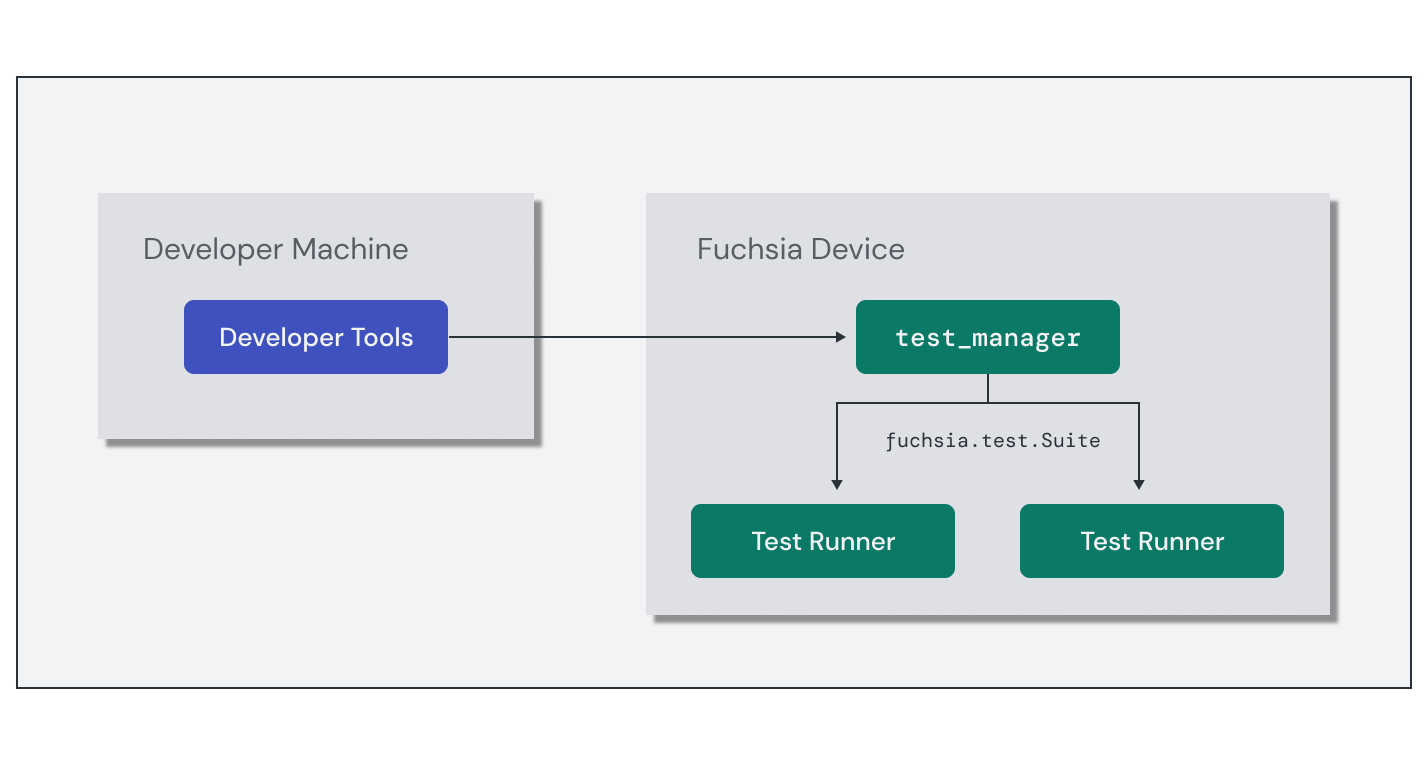The Fuchsia Test Runner Framework enables developers to build tests for
components using a variety of languages and runtimes and execute them on a
target device. The framework provides test runner components that implement
the fuchsia.test.Suite protocol and integrate with common language-specific
testing frameworks such as GoogleTest (C++).
The test_manager component is responsible for running tests on a Fuchsia
device. It examines components implementing the test suite protocol and launches
them as child components. This means that test_manager is also responsible for
providing capabilities to each test suite, creating what is commonly called the
test realm.

Developer tools such as ffx test communicate with the test_manager on the
device to execute test suites and retrieve the results.
Test runners
Test runners are reusable adapters between the Test Runner Framework and common
frameworks used by developers to write tests in their preferred
language. Each test runner component exposes the fuchsia.test.Suite capability
that enables the test_manager to enumerate and execute individual tests, and
declares the appropriate execution runner with test framework support.
Rust
{
// Execute tests using language-specific runner
program: { runner: "rust_test_runner" },
// Expose test suite protocol to test manager
capabilities: [
{ protocol: "fuchsia.test.Suite" },
],
expose: [
{
protocol: "fuchsia.test.Suite",
from: "self",
},
],
}
C++
{
// Execute tests using language-specific runner
program: { runner: "gtest_runner" },
// Expose test suite protocol to test manager
capabilities: [
{ protocol: "fuchsia.test.Suite" },
],
expose: [
{
protocol: "fuchsia.test.Suite",
from: "self",
},
],
}
To simplify integration, the Test Runner Framework provides manifest shards for each language-specific runner. The following is an equivalent test runner CML for declaring the capabilities from the previous example component tests.
Rust
{
include: [ "//src/sys/test_runners/rust/default.shard.cml" ]
}
C++
{
include: [ "//src/sys/test_runners/gtest/default.shard.cml" ]
}
Unit tests
Unit testing focuses on validating the individual units of code within your component and isolated from other components on the system. Unit tests should be hermetic, meaning that they do not require or provide additional capabilities outside of the test.
The Fuchsia build system provides additional GN targets to facilitate unit testing components:
fuchsia_unittest_package(): A single-component package that automatically generates a minimal component manifest to reference the test binary and requires no additional capabilities.fuchsia_unittest_component(): A component declaration that generates the same minimal component manifest. This rule is useful if you need to build multiple unit test components into the samefuchsia_package().
Below is an example BUILD.gn snippet for including unit tests:
import("//build/components.gni")
executable("bin_test") {
sources = [ "main_test.cc" ]
deps = [
"//src/lib/fxl/test:gtest_main",
"//third_party/googletest:gtest",
]
testonly = true
}
fuchsia_unittest_package("hello-world-unittests") {
deps = [
":bin_test",
]
}
Exercise: Echo unit tests
In this exercise, you'll add unit tests to the echo-args component with the
Test Runner Framework and run those tests in a FEMU environment.
Implement unit tests
Unit tests verify that the internal functions of the component behave as
expected. For the echo-args component, you'll validate that the greeting()
function used in the previous exercise returns the expected values.
Add the following unit test functions to validate the behavior of the
greeting() function when supplied with one, two, or three arguments:
Rust
echo-args/src/main.rs:
#[cfg(test)]
mod tests {
#[fuchsia::test]
async fn test_greet_one() {
let names = vec![String::from("Alice")];
let expected = "Alice";
assert_eq!(super::greeting(&names), expected);
}
#[fuchsia::test]
async fn test_greet_two() {
let names = vec![String::from("Alice"), String::from("Bob")];
let expected = "Alice and Bob";
assert_eq!(super::greeting(&names), expected);
}
#[fuchsia::test]
async fn test_greet_three() {
let names = vec![String::from("Alice"), String::from("Bob"), String::from("Spot")];
let expected = "Alice, Bob, Spot";
assert_eq!(super::greeting(&names), expected);
}
}
C++
echo-args/echo_unittest.cc:
#include <gtest/gtest.h>
#include "vendor/fuchsia-codelab/echo-args/echo_component.h"
TEST(EchoTest, TestGreetOne) {
std::vector<std::string> names = {"Alice"};
std::string expected = "Alice";
ASSERT_TRUE(echo::greeting(names) == expected);
}
TEST(EchoTest, TestGreetTwo) {
std::vector<std::string> names = {"Alice", "Bob"};
std::string expected = "Alice and Bob";
ASSERT_TRUE(echo::greeting(names) == expected);
}
TEST(EchoTest, TestGreetThree) {
std::vector<std::string> names = {"Alice", "Bob", "Spot"};
std::string expected = "Alice, Bob, Spot";
ASSERT_TRUE(echo::greeting(names) == expected);
}
Update the build configuration
Add the following rules to your BUILD.gn file to generate a new unit test package:
Rust
echo-args/BUILD.gn:
group("tests") {
testonly = true
deps = [ ":echo-args-unittests" ]
}
fuchsia_unittest_package("echo-args-unittests") {
deps = [ ":bin_test" ]
}
C++
echo-args/BUILD.gn:
group("tests") {
testonly = true
deps = [ ":echo-args-unittests" ]
}
executable("unittests") {
output_name = "echo-args-test"
testonly = true
sources = [ "echo_unittest.cc" ]
deps = [
":cpp-lib",
"//src/lib/fxl/test:gtest_main",
"//third_party/googletest:gtest",
]
}
fuchsia_unittest_package("echo-args-unittests") {
deps = [ ":unittests" ]
}
This rule packages your unit tests into a component with the following URL:
fuchsia-pkg://fuchsia.com/echo-args-unittests#meta/echo-args-unittests.cm
Run the unit tests
Update the top-level build target to build both your component package and the test package:
Rust
echo-args/BUILD.gn:
import("//build/components.gni")
import("//build/rust/rustc_binary.gni")
group("echo-args") {
testonly = true
deps = [
":package",
":tests",
]
}
C++
echo-args/BUILD.gn:
import("//build/components.gni")
group("echo-args") {
testonly = true
deps = [
":package",
":tests",
]
}
Run fx build again to build the test package:
fx buildUse the ffx test command to execute the unit tests inside this package.
Verify that the tests pass:
ffx test run \
fuchsia-pkg://fuchsia.com/echo-args-unittests#meta/echo-args-unittests.cm